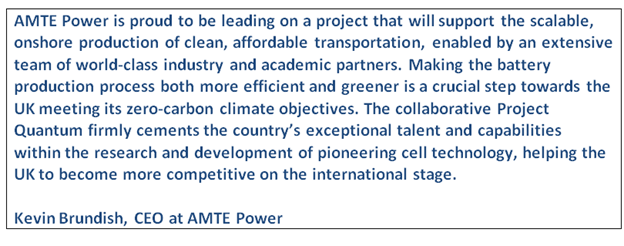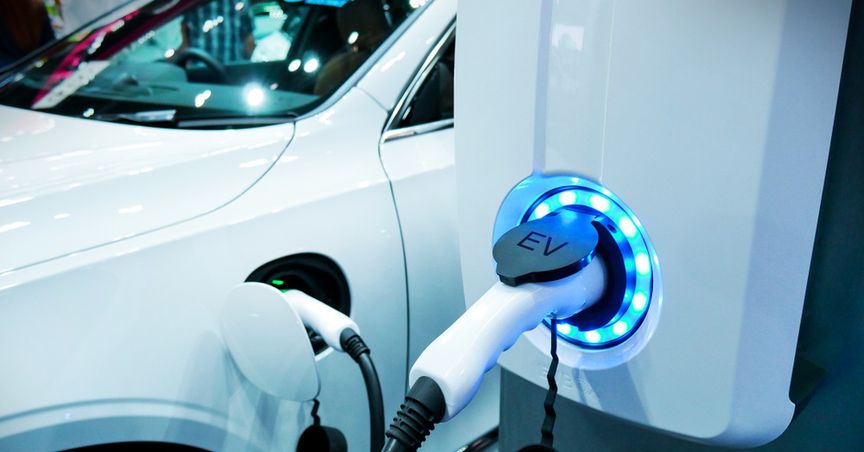Summary
- A £5.4-million Project Quantum has been launched to make Britain a key player in the booming EV battery manufacturing space.
- Project Quantum was launched in August and intended to keep Britain at the forefront of scalable battery manufacturing.
- AMTE Power would lead the three-year project with an intention to commercialise quantum technology for batteries.
- The project has brought together nine different players from the industry and academic sectors
In order to make Britain a key player in the gradually expanding electric vehicle (EV) battery manufacturing space, a £5.4 million Project Quantum has been launched. The three-year project with an intention to commercialise quantum technology for batteries is kickstarted by AMTE Power, a British battery manufacturer, and has brought together nine different partners from the industry and academia under its fold.
Project Quantum
Project Quantum was launched in August and aims to keep Britain at the forefront of scalable battery manufacturing. AMTE Power expects that in the next five years, the battery market would be worth $5 billion. There would be an increased demand for the lithium ion batteries as the UK would move towards electrification. AMTE Power stated that one in every five cars sold by 2026 would be an electric car. This number would increase rapidly to comprise around 50 per cent of the UK car fleet to be electric by 2030.
The quantum technology, which has been specially designed for batteries for the EVs, would overcome the inefficiencies in lithium cell manufacturing. This would potentially enhance quality yields as well as speed up manufacturing.
AMTE Power officials said like other manufacturers, it would face the challenge of cell formation and ageing processes that potentially takes up to three weeks’ time, accounting for around 30 per cent of the cost. The firm’s manufacturing required a non-invasive monitoring of the cell ageing process.
The latest development within the quantum sensing technology would not only reduce the cost of production but also provide extra capabilities for grading battery quality. This means that the additional cells can be quickly manufactured and will be profitable.
AMTE Power would assimilate this process into its pouch cell assembly with processes trailed on its various cells. At present, these cells are commercialised for the automobile market. The company believed that the quality power cells would give it a competitive edge in capturing a larger market share, besides being beneficial to the entire industry.
In this project, AMTE Power would associate with Centre for Process Innovation, University of Strathclyde, University of Sussex, Compound Semiconductor Technologies, Magnetic Shields, Alter Technology Ltd, CDO2, Compound Semiconductor Centre Ltd, and Kelvin Nanotechnology Ltd.

Also read: Quick Insights on Two Basic Materials Stocks: Bacanora Lithium & Keras Resources
Also read: General Motors goes aggressive on EV bet, takes 11% stake in Nikola
The company has an objective of manufacturing the batteries in its planned gigafactory. The pioneering UK Battery Industrialisation Centre (UKBIC) unit would be commenced in the near future and work for making the UK a world leader in battery development and manufacturing. This would set off AMTE Power’s plans to open Britain’s pioneering gigafactory to manufacture millions of cells annually.
The Coventry-based £130 million UKBIC is a revolutionary concept for developing battery technology to meet the aim of the country's transitioning to a greener future. The centre offers a missing link between battery technology that proved itself at the laboratory scale and its successful mass production. Any firm with old or new battery technology could access this publicly-funded battery product development centre.
Thurso-based AMTE Power Ltd (erstwhile AGM Batteries Limited, a joint venture between AEA Technology, GS (GS Yuasa) and Mitsubishi Materials), was launched in 1997 and is a well-known for manufacturing lithium-ion batteries for various market segments, including automobile, defence, aerospace, oil & gas, and energy storage.
More players
In May, AMTE Power signed a memorandum of understanding with Britishvolt, which was a step towards making Britain a leader in the lithium-ion manufacturing space. Under the deal, both the companies would share their knowledge and expertise for expanding Britain’s onshore manufacturing capabilities and supply chain.
Under the deal, AMTE Power and Britishvolt would together develop two new plants as part of a £4-billion investment programme. Britishvolt is one of Britain's leading investors in battery technologies. The company produces lithium-ion battery technologies to support the future of electrified transportation and sustainable energy storage.
In alignment with the government’s industrial strategy that clearly showed its goals and aspirations on EV and innovative technologies for battery manufacturing, Britain needed to develop a model infrastructure to further assist companies such as AMTE Power’s gigafactory expansion initiatives. The future of the industry and economy would be driven by continued innovation and collaboration with forward looking institutions and investors.




